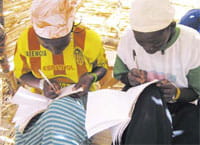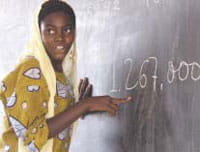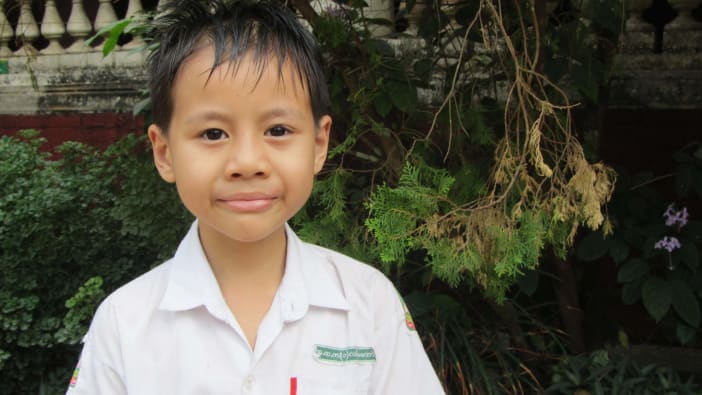Alima is in her second year of literacy classes. ‘I am 51 years old’ she says with a shy smile. ‘I learn slowly. I had to re-take my first year, but since then everything is going well.’ Two of her granddaughters have followed her example and attend the classes with her.
Their village, Ngula, is 80km from the nearest road, on the border between Niger and Burkina Faso. Alima has never been to school as her father considered that it was a pointless expense. Now she has made her own decision to learn to read and write in her language, Djerma, and goes to classes five times a week. The classes are held at the new school, while the children are eating their lunch. Ngula’s literacy centre is one of the 200 centres managed by the CADEV-Niger Literacy and Libraries Programme, one of the programmes run by a local NGO, Caritas-Développement Niger.
A second chance
According to the Niger Institute of Statistics, the literacy rate in adults (15 years and above) in Niger in 2005 was about 29%. This means that around 70% of adults in Niger do not know how to read or write. There are several reasons for the literacy rate being so low: the most obvious being the lack of schools and the severe lack of funding for education. In the rural areas, where 80% of the population live, parents are not always interested in sending their children into a failing school system, whereas everyone is encouraged to do agricultural work. Because of colonialism, the formal education system uses the French language, which for many children is not their first language.
Literacy classes in local languages therefore represent a second chance for many people in Niger. They are not just for adults. Young people under 12 years old are often accepted at the Programme’s centres either because the nearest school is too full for them to enrol, or because there is no school in their area.
The centres all follow the same Waye Kai approach to teaching, but in different languages according to the region. Waye Kai means ‘awakening’ in Haoussa, the most widely-spoken language in Niger, and this approach is largely inspired by the theories of Brazilian teaching specialist, Paulo Freire. In contrast to the standard method of teaching literacy, the Waye Kai approach wants to raise awareness: it is not simply a question of learning to read, write and calculate. The teaching involves the whole of the student’s environment, their work activities, their family life, social life and leisure time. It aims, in time, to improve all these different aspects of their life.
Learning through involvement
Active involvement is required from those who wish to learn. A student does not just passively absorb teaching from an all-powerful teacher. Instead, from the beginning of the course, the students choose a range of discussion topics based on common issues such as marriage, relationships, money, hygiene in the home, malaria, and bringing up children.
The Waye Kai approach values the student as someone who already possesses a wealth of knowledge, to which new knowledge can be added. Through the group discussion and by composing simple sentences which relate to the day’s subject, each student will gradually learn the techniques for reading and writing in their own language. By making progress within the group and participating on all levels, the student will also learn about criticism and gain self-confidence. At the same time, these discussions about everyday topics can raise issues and inspire the group to address issues in their community and to change behaviour. Through learning to read and write sentences about health and sanitation topics, for example, the students can decide on simple but specific actions to take within their community.
More than just teachers
The role of the teachers is also changed: they become facilitators who work alongside their group. Depending on the topics chosen by the group of students, they may need to research a subject themselves or ask a local expert such as a doctor. Hawa, aged 36, is a Waye Kai teacher. As she had been to school for three years, her level of French was good but she did not know how to read or write in her own language. After learning, she wanted to become a teacher. She started raising awareness about literacy among a group of women from her district. From the start, the students took ownership of the lessons. They discussed between themselves and decided together the way in which the lessons would be carried out, the timetables, and how absences and late arrivals would be managed.
The students will ask either during or after the class for explanations on those points which are difficult to understand from the day’s lesson. All the students live in the same district and are neighbours, which means that after their lessons they can discuss and clarify questions or explain points to each other. ‘It’s an extension of their social life’, explains Hawa. Hawa herself appreciates the interaction: ‘You teach things to the students and they teach you other things’. She also likes to do research in order to deepen her own knowledge before starting on a new topic.
The Waye Kai approach favours initiative and creativity: there is no set method and no routine teaching. However, the teachers are given teaching booklets which provide information on various topics such as health, the human body, animals and vegetation, social life, history, geography and help them to monitor their group’s progress. Currently, the teaching programme is based on four one-year levels and is provided in five local languages. At the third level, French is introduced for a few hours per week. The fourth level, entirely in French, goes over the basic points from the second and third years, which were taught in the local languages.
Benefits
Throughout Niger, literacy is a crucial factor for development. Literate men and women are better able to find work and more likely to send their children to school. They understand more about hygiene and common illnesses and they go more willingly to the community clinic. They are able to participate more fully in community and democratic life and more able to join savings groups or have bank accounts. Above all, they discover that they have power – power to take charge of their own lives.
Laurence Buenerd is a Uniterra volunteer for CADEV-Niger.
Laurence Buenerd, Volontaire Uniterra, CADEV-Niger, Niamey, Niger.
Email: [email protected]









